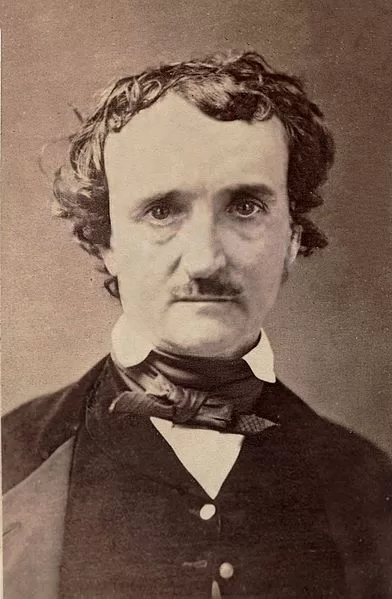1809 – 1849

Edgar Allan Poe
Poe began his life in 1809, shortly after the passing of his parents, who were both actors. Edgar Allan Poe was sent to be raised by John and Frances Allan in Richmond, Virginia. John Allan a successful tobacco exporter provided Poe with a privileged upbringing. Sending him to the most prestigious boarding schools and later to the University of Virginia. This is where he excelled academically. However, his time at the university was cut short when Allan refused to pay his gambling debts. Forcing him to leave the university and start over.
Edgar Allan Poe briefly returned to Richmond but had a deteriorating relationship with Allan. In 1827, he joined the United States Army in Boston. That same year, his first collection of poems, titled “Tamerlane, and Other Poems,” was published. Unfortunately, it did not receive the publicity and attention he had hoped for. After his military service, Poe tried to gain admission to the United States Military Academy. But again was unsuccessful in this venture due to a lack of financial support. He then moved in with his aunt Maria Clemm and her daughter, Virginia, in Baltimore.
Starting His Works
During this time, Poe started selling short stories to magazines and became the editor of the Southern Literary Messenger in Richmond in 1835. He married Virginia, who was only thirteen years old at the time, in 1836. Over the next decade, Poe edited several literary journals and solidified his reputation as a poet, short story writer, and editor. Some of his most famous works, such as “The Fall of the House of Usher,” “The Tell-Tale Heart,” “The Murders in the Rue Morgue,” and “The Raven,” were published during this period. Unfortunately, after Virginia’s death, tragedy struck.
Edgar Allan Poe – Life Changes
Poe’s life took a turn for the worse after the death of his beloved wife. He fell into a deep depression and struggled with alcoholism, which further exacerbated his already fragile mental state. Despite his literary success, Poe faced financial difficulties and was often in debt.
In the years following Virginia’s death, Poe’s health deteriorated rapidly. He suffered from frequent bouts of illness and was plagued by hallucinations and delusions. His erratic behavior and declining mental health strained his relationships with friends and colleagues.
His Untimely Death
In 1849, Poe was found delirious on the streets of Baltimore and was taken to a hospital. He died a few days later, at the age of 40, under mysterious circumstances. The exact cause of his death remains unknown, with theories ranging from alcohol poisoning to rabies.
Although Poe’s life was marked by tragedy and hardship, his literary contributions had a profound impact on the development of the horror and detective genres. His unique writing style, characterized by dark themes, psychological depth, and intricate plots, continues to captivate readers to this day. Despite his untimely demise, Edgar Allan Poe’s legacy as one of America’s greatest literary figures endures, and his works continue to be celebrated and studied worldwide.












































































































